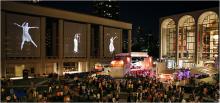Check Your Head:
Somatic, Interdisciplinary and Transdisciplinary Techniques in Performance Art Education and Practice
In an effort to inspire and strengthen innovative thinking, problem solving skills and authentic expression from students while working outside of the typical system of dichotomized and/or binary goal sets, Pete DiGennaro engages the neuro-somatic practice of synaesthesia in tandem with the formal technical and compositional studies of “mixing” the elemental topography of a performance context. This knowledge and practice is then used to engage and couple the personal social, cultural, political and historic contexts which art and the artist experiences and addresses.
At the Educational Center for the Arts in New Haven, CT, his class “The Rhythm is the Rebel” brings together students of disparate disciplinary, socio-economic and cultural backgrounds to collaborate and inform each other’s explorative practices and expository artwork. A group performance/installation effort is the culmination of each semester’s work. The study of synaesthesia is a distinct study and practice point for directly transmitting personal experience through one’s art and to the artistic witness, as well as transmuting and transgressing personal binaries in order to engage a clearer and wider personal understanding of the subject matter, one’s own experience of it and its possible causal relationships to the world. Likewise, this past summer, Mr. DiGennaro directed a program of students and teachers at the Neighborhood Music School working from both interdisciplinary and transdisciplinary approaches as they drew from World Music sources in their personal and collaborative efforts – embodying other cultures’ compositional structures, as well as the rhythmic and melodic topography of other instruments. Furthermore, NMS’ yearlong Rock Program under his direction engages students of all ages in interdisciplinary and transdisciplinary curriculum through Ensemble work. While studying both the historical and cultural significance of genres and performers, as well as the somatic relationship of people to art, students in both programs are, ultimately, practicing the contextualization and recontextualization of both original material, pedagogy and different scenarios in order to develop creative problem solving skills, innovative thinking and the constitution to express and publicize it within a social context.
Peter DiGennaro is a New Haven based writer, musician and sound designer teaching primarily middle school and high school age students through interdisciplinary and transdisciplinary curriculum at both the Educational Center for the Arts and The Neighborhood Music School where he is also Director of the NMS Summer Rocks! Program. As an Artist-Instructor, Mr. DiGennaro’s work centers around the examination of social, cultural and political phenomena through artistic movements and, most importantly, practices. In particular, Mr. DiGennaro engages a synaesthetic approach to teaching and art practices.
In addition to his 20 years of teaching and performing, Mr. DiGennaro is a member of the National Association of Music Educators, has scored many film, theatre and, most of all, dance projects (Elm Shakespeare, CPTV, HartBeat Ensemble, Wesleyan University, Pedro Allejandro and others) and is the Director of Vesper Studios in the Westville Artist Village in New Haven. He has worked in the Wesleyan University Dance Department for the last fifteen years as a music consultant and accompanist and taught at the Greater Hartford Academy of the Arts from 2005 – 2011. In 2007 and 2008, he taught songwriting in Cape Verde, Africa through “CCY in Cape Verde”, a program sponsored by the Capital Region Educational Council and the Department of Sports and Culture of Cape Verde.
